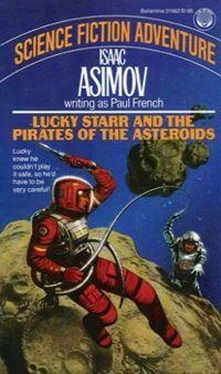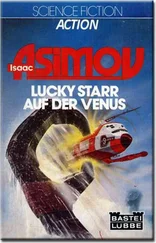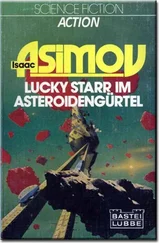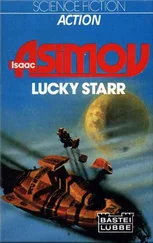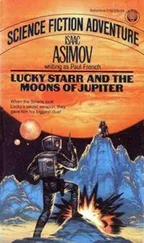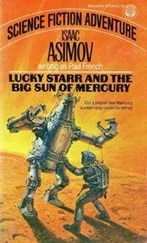Isaac Asimov - Lucky Starr and the Pirates of the Asteroids
Здесь есть возможность читать онлайн «Isaac Asimov - Lucky Starr and the Pirates of the Asteroids» весь текст электронной книги совершенно бесплатно (целиком полную версию без сокращений). В некоторых случаях можно слушать аудио, скачать через торрент в формате fb2 и присутствует краткое содержание. Город: New York, Год выпуска: 1978, ISBN: 1978, Издательство: Doubleday & Co., Inc., Жанр: Фантастика и фэнтези, на английском языке. Описание произведения, (предисловие) а так же отзывы посетителей доступны на портале библиотеки ЛибКат.
- Название:Lucky Starr and the Pirates of the Asteroids
- Автор:
- Издательство:Doubleday & Co., Inc.
- Жанр:
- Год:1978
- Город:New York
- ISBN:ISBN 0-8398-2487-4
- Рейтинг книги:5 / 5. Голосов: 1
-
Избранное:Добавить в избранное
- Отзывы:
-
Ваша оценка:
- 100
- 1
- 2
- 3
- 4
- 5
Lucky Starr and the Pirates of the Asteroids: краткое содержание, описание и аннотация
Предлагаем к чтению аннотацию, описание, краткое содержание или предисловие (зависит от того, что написал сам автор книги «Lucky Starr and the Pirates of the Asteroids»). Если вы не нашли необходимую информацию о книге — напишите в комментариях, мы постараемся отыскать её.
Lucky Starr and the Pirates of the Asteroids — читать онлайн бесплатно полную книгу (весь текст) целиком
Ниже представлен текст книги, разбитый по страницам. Система сохранения места последней прочитанной страницы, позволяет с удобством читать онлайн бесплатно книгу «Lucky Starr and the Pirates of the Asteroids», без необходимости каждый раз заново искать на чём Вы остановились. Поставьте закладку, и сможете в любой момент перейти на страницу, на которой закончили чтение.
Интервал:
Закладка:
By the time Mercury's orbit was reached the radiation counters had gone completely mad. Their chatter was continuous. Lucky placed a glimmering hand over their windows and their noise stopped. Down to the hardest gamma rays the radiation penetrating and filling the ship was stopped by the resistance of the insubstantial aura that surrounded his body.
The temperature which had reached a low of eighty, was climbing again, despite the mirror skin of the Shooting Starr. It passed one hundred fifty and still went up. The gravimetrics indicated the Sun to be only ten million miles away.
A shallow dish of water, which Lucky had placed upon the table, and which had been steaming for an hour past, was now bubbling outright. The thermocouple reached the boiling point of water, two hundred and twelve degrees.
The Shooting Starr, whipping about the Sun, was now five million miles away. It would approach no closer. Actually it was inside the outermost wisps of the most rarefied portion of the Sun's atmosphere, its corona. Since the Sun was gaseous through and through (though most of it was a gas the like of which could not exist even under the most extreme laboratory conditions on Earth), it had no surface, and its "atmosphere" was part of the very body of the Sun. By going through the corona, then, Lucky was, in a way, going through the Sun, as he had told Bigman he would.
Curiosity tugged at him. No man had ever been this close to the Sun. No man, perhaps, ever would again. Certainly, any man who did, could not look at the Sun with his unaided eyes. The shortest possible glimpse of the Sun's tremendous radiation at that distance would mean instant death.
But he was wearing the Martian energy shield. Could it handle solar radiation at five million miles? He felt he ought not take the chance and yet the impulse tugged desperately at him. The ship's chief visiplate was outfitted with a stroboscopic outlet-series, one which would expose, one by one, each of a series of sixty-four outlets to the Sun, each for a millionth of a second every four seconds. To the eye (or to the camera), it would seem a continuous exposure, but actually any given piece of glass would only get one four millionth of the radiation the Sun was emitting. Even that required specially designed, nearly opaque lenses.
Lucky's fingers moved remorselessly, almost without conscious volition, to the controls. He could not bear the thought of losing the chance. He adjusted the plate direction toward the Sun, using the gravimetrics as indicators.
Then he turned his head away and plunged the contact home. A second passed, then two seconds. He imagined an increase in heat on the back of his neck; he half-waited for radiation death. Nothing happened.
Slowly he turned.
What he saw was to stay with him the rest of his life. A bright surface, puckered and wrinkled, filled the visi-plate. It was a portion of the Sun. He could not see the whole, he knew, in the visiplate, for at his distance, the Sun was twenty times as wide as it seemed from Earth and covered four hundred times as much of the sky.
Caught in the visiplate were a pair of sunspots, black against the brightness. Threads of glowing white curled into it and were lost. They were heaving areas of activity that moved across the plate visibly as he watched. This was not due to the Sun's own motion of rotation, which, even at its equator, was not more than fourteen hundred miles an hour, but rather to the tremendous velocity of the Shooting Starr.
As he watched, gouts of red, naming gas shot up toward him, dim against the blazing background, and turning a smoky black as it receded from the Sun and cooled.
Lucky shifted the plate, catching a portion of the rim of the Sun, and now the flaming gas (which were the so-called "prominences," consisting of gigantic puffs of hydrogen gas) stood out sharply crimson against the black of the sky. They spread outward in slow motion, thinning and taking on fantastic shapes. Lucky knew that each one of them could engulf a dozen planets the size of Earth, and that the Earth could be dropped into the sunspot he saw without even making a respectable splash.
He closed the stroboscopics with a sudden movement. Even though physically safe, no man could stare at the Sun from that distance without becoming oppressed by the insignificance of Earth and all things Earthly.
The Shooting Starr had whipped half around the Sun and was now receding rapidly past the orbits of Mercury and Venus. It was decelerating now. The ship's prow opposed the direction of its flight and its powerful main engines were acting as brakes.
Once past Venus's orbit, Lucky removed his shield and stowed it away. The ship's cooling system strained to get rid of the excess heat. Drinking water was still uncomfortably hot and the canned foods bulged where liquid within had bubbled into gas.
The Sun was shrinking. Lucky looked at it. It was an even, glowing sphere. Its irregularities, its churning spots, and heaving prominences could no longer be seen. Only its corona, always visible in space, though visible on Earth only during eclipses, thrust out in every direction for millions of miles. Lucky shuddered involuntarily to think that he had passed through it.
He passed within fifteen million miles of Earth, and through his telescope he spied the familiar outlines of the continents peeping through the ragged white masses of cloud banks. He felt a twinge of homesickness and then a new resolve to keep war away from the teeming, busy billions of human beings that inhabited that planet, which was the origin of all the men that now occupied the far-flung star systems of the Galaxy.
Then the Earth, too, receded.
Past Mars and back into the asteroid belt, Lucky still aimed at the Jovian system, that miniature solar system within the greater one. At its center was Jupiter, larger than all the other planets combined. About it swung four giant moons, three of them, lo, Europa, and Callisto, about the size of the Earth's Moon, and the fourth, Ganymede, much larger. Ganymede, in fact, was larger than Mercury, and almost as large as Mars. In addition there were dozens of moonlets, ranging from some hundreds of miles in diameter down to insignificant rocks.
In the ship's telescope Jupiter was a growing yellow globe, marked with faintly orange stripes, one of which bellied out into what was once known as the "Great Red Spot." Three of the main moons, including Ganymede, were on one side, the fourth was on the other.
Lucky had been in guarded communication with the Council's main offices on the Moon for the better part of a day now. His Ergometrics probed space with widely stretching fingers. It detected many ships, but Lucky watched only for the one with the Sirian motor pattern which he would recognize with certainty the instant it appeared.
Nor did he fail. At a distance of twenty million miles, the first quiverings roused his suspicions. He veered in the proper direction, and the characteristic curves grew more pronounced.
At one hundred thousand miles, his telescope showed it as a faint dot. At ten thousand, it had form and shape and was Anton's ship.
At a thousand miles (with Ganymede still fifty million miles away from both ships), Lucky sent out his first message, a demand that Anton turn his ship back toward Earth.
At one hundred miles Lucky received his answer-a blast of energy that made his generators whine and shook the Shooting Starr as though it had collided with another ship.
Lucky's tired face took on a drawn look.
Anton's ship was better-armed than he had expected.
Chapter 15
Part Of The Answer
For an hour the maneuvers of both ships were indecisive. Lucky had the faster ship and the better, but Captain Anton had a crew. Each of Anton's men could specialize. One could focus and one could release, while a third could control the reactor banks and Anton himseh0 could direct operations.
Читать дальшеИнтервал:
Закладка:
Похожие книги на «Lucky Starr and the Pirates of the Asteroids»
Представляем Вашему вниманию похожие книги на «Lucky Starr and the Pirates of the Asteroids» списком для выбора. Мы отобрали схожую по названию и смыслу литературу в надежде предоставить читателям больше вариантов отыскать новые, интересные, ещё непрочитанные произведения.
Обсуждение, отзывы о книге «Lucky Starr and the Pirates of the Asteroids» и просто собственные мнения читателей. Оставьте ваши комментарии, напишите, что Вы думаете о произведении, его смысле или главных героях. Укажите что конкретно понравилось, а что нет, и почему Вы так считаете.
